
Posted July 10, 2024
By Byron King
The Houthis are Inflationary!
Let’s talk about inflation, with a focus on the Houthis in Yemen, the people who have been shooting missiles at cargo ships and tankers that transit through the Red Sea. It may all seem far away, but this whole mess costs you money.
A Quick Geography Lesson
Long ago, an old Navy instructor explained that war is God’s way of teaching geography to Americans. With that in mind, let’s set the stage for what we’ll discuss using a map of the Middle East:
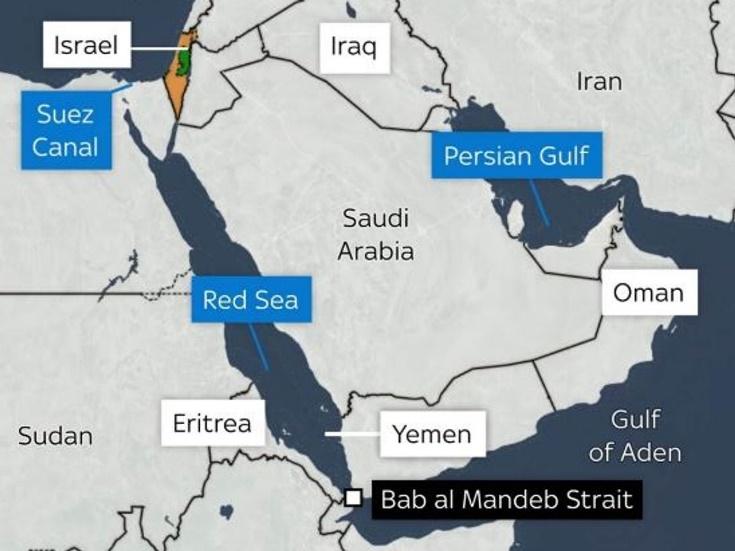
Familiar, yes?
There’s much familiar geography here, right? Saudi Arabia, the Persian Gulf, Iran, Israel, the Red Sea, etc.
Obviously, suppose you want to transit from the Indian Ocean area or South Asia region into the Mediterranean Sea. In that case, you must transit past Yemen, through the Red Sea and Suez Canal, and vice versa if you’re going from West to East on the return journey.
Beware Flying Missiles
Since November 2023, as you may know, Yemen’s Houthis have been shooting missiles at Western ships, especially any that have anything to do with Israel. This reflects Houthi support for people in Gaza, the area subject to Israeli reprisals since shortly after the Hamas attack of October 7 last year.
According to the Houthis, if a ship is owned by Israelis or carries cargo to/from Israel, it is subject to attack.
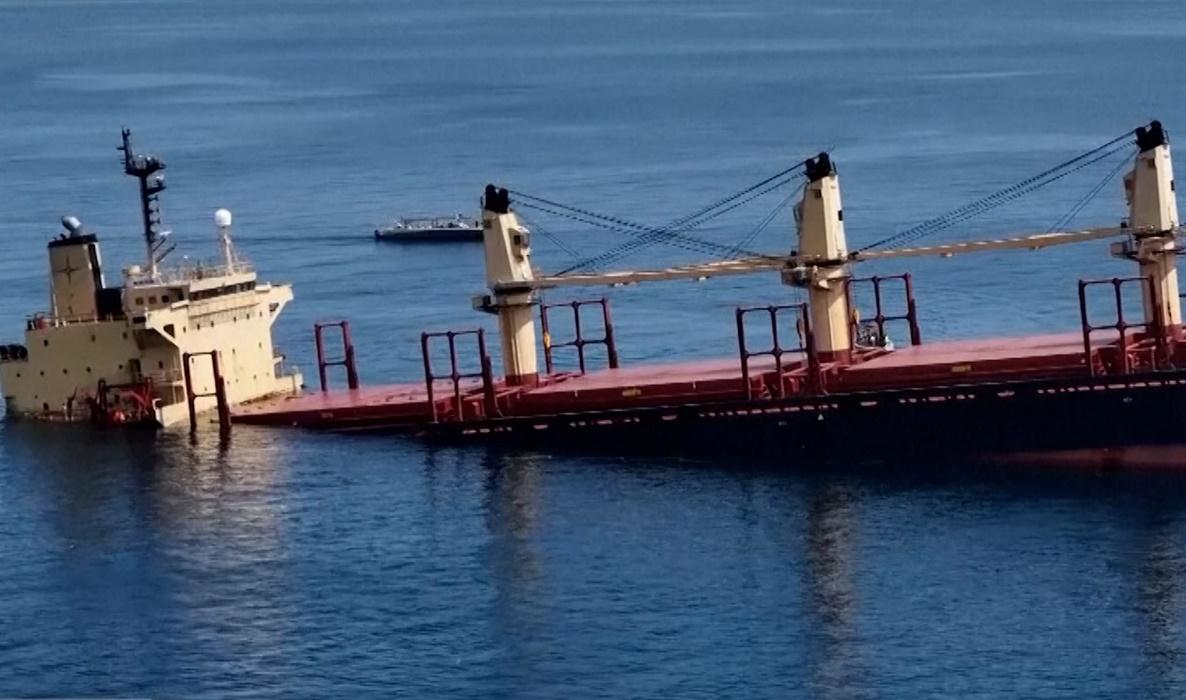
British cargo ship sinking in Red Sea after Houthi missile strike. Courtesy: Al Jazeera.
Until recently, neither Yemen nor its indigenous Houthis were considered a significant military power, although they are hard people, tough as nails. Over several years during the 2010s, Houthis fought Saudi Arabia's armed forces to a standstill over border regions.
It’s also fair to say that most Houthi military equipment is a collection of older stuff, scavenged from all over. However, when it comes to the higher ends of combat power, Iran has provided anti-ship missiles to the Houthis along with targeting systems, intelligence, and likely more than a few… ahem… “trainers” to help operate the equipment.
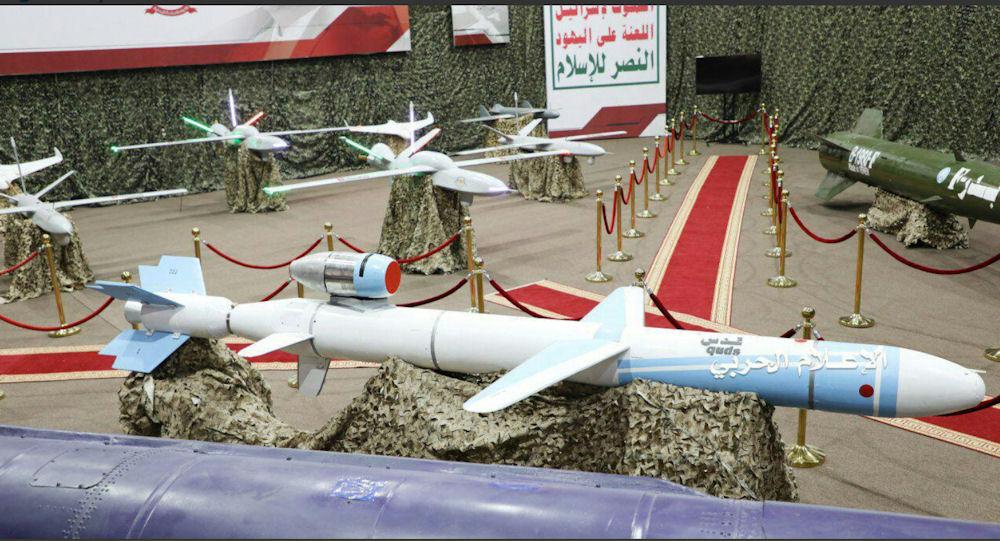
Yemen Houthis display anti-ship missiles. GlobalSecurity.org.
It’s worth noting that many of the types of missiles the Houthis use are old designs, about 1960s era, from the days of the Soviet Union and later China. But these are new-built items, now manufactured in quantity in Iran. And despite the technology DNA being relatively old, these Iranian/Houthi missiles work just fine to hit civilian ships. Definitely, they can kill you.
Indeed, despite age and technical pedigree, even modern naval defense systems must work at the top of their collective game to identify and track these kinds of fast-moving weapons, let alone shoot them down.
On affected East-West cargo routes, and to avoid getting shot, many ship owners and captains understandably have steered clear of Yemen and the Red Sea transit because even ships that have nothing to do with Israel have been targeted.
Since late 2023, the number of ship transits through the Red Sea has declined dramatically by about 80%, according to tracking data maintained by PortWatch, a shipping organization located at Oxford University.
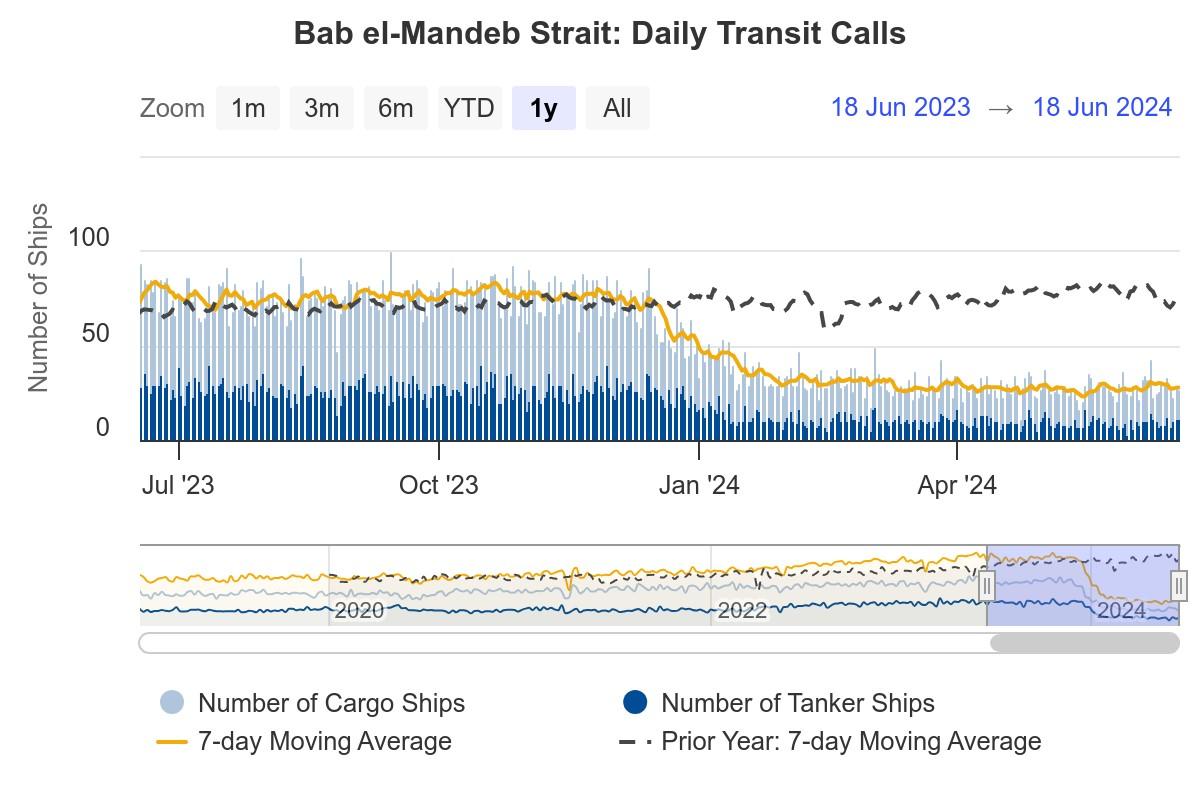
Transits through the Red Sea have declined dramatically. PortWatch/Oxford University.
This is All Getting Expensive
According to one analyst with whom I recently spoke, about 40% of even U.S.-bound cargo containers (those 40-foot beasts you see on ships and eventually rail cars and trucks) pass through the Red Sea on their way from Asia to North America, so this is not “just” a problem for Europe and the Mediterranean region.
Meanwhile, none of this comes cheap. The long reroute around Africa to avoid Houthi missiles adds much time, distance, fuel burn, and more to the transit between Asia and Europe, let alone the U.S. and Canada.
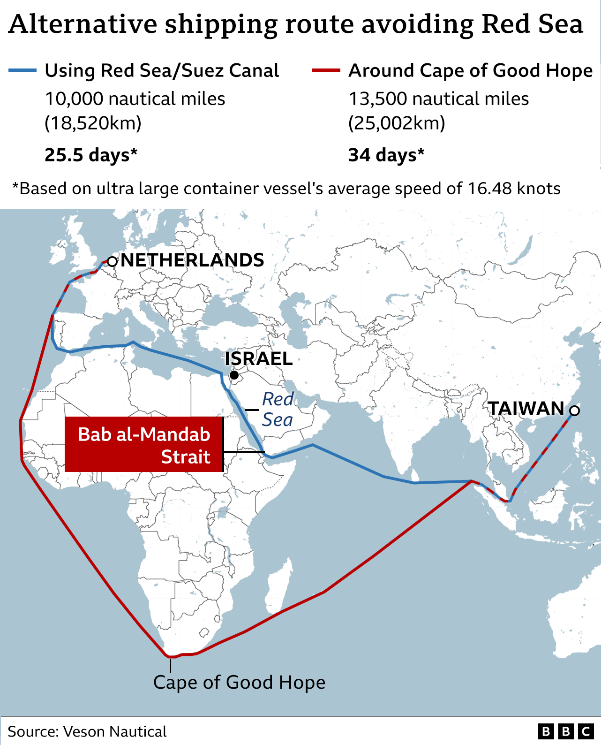
Avoiding the Red Sea requires time, distance, fuel, and more. Courtesy BBC.
Every large cargo or tanker ship that diverts from the Red Sea and sails around Africa (see above) runs up about another million dollars per one-way voyage just in fuel, according to a recent report by the U.S. Defense Intelligence Agency. Plus, add the increased costs for labor, insurance premiums for war risk, and general delays due to possible weather events in the Atlantic. And all these diversions add up to serious money.
There is a long list of cost elements to rerouting ships, but the bottom line is more expensive goods when those containers finally reach the port of destination. Every container, or other form of cargo, has spent more time at sea, racked up more energy burn, and all manner of general overhead related to the sea voyage.
And you will pay that cost when you buy imported goods at the store, whether it’s T-shirts from Sri Lanka or television sets from China.
Iran’s Economic War Against the West
Let’s also mention the military costs to the U.S. Navy and warships of other friendly nations, for patrolling the now-dangerous waters adjacent to Yemen. Their role is to track and, if necessary, shoot down Houthi missiles aimed at friendly ships, or even conduct strikes against Houthi launch sites.
In a manner typical of wartime operations, the cost equation is highly imbalanced. For example, a U.S. Navy ship might launch two antiaircraft missiles that cost, say, a million dollars each, to shoot down an anti-ship missile that Iran built for, say, $100,000. Then again, that’s the idea because Iran is waging an economic war against the West – certainly against Israel – via its proxies in Yemen.
As stated another way, Houthis has no indigenous missile-manufacturing industry; there are no factories to make parts and components, let alone fabricate sophisticated aerodynamic shapes, engines, warheads, etc. Almost all their weapons come from Iran, and it’s a “just in time” combat logistics process in which Iran-associated ships smuggle weapons into Yemen by night. A few days later, these devices are being set up and launched.
Over the past seven months, several ships have been sunk by Houthi missiles, and many more damaged. Ships have experienced death and injuries to the crew, often as not, individuals hailing from developing nations like the Philippines or India, people with nothing to do with Israel or any other Western country.
In essence, Iran is costing the West serious money in terms of threatening cargo ships and tankers, additional expenses to defend the seaways or reroute voyages, and extra costs for goods that finally make it to their destination. So, buying things that made that extra-long voyage is coming out of your wallet.
Halfway through 2024, there’s no good, workable military solution to the Houthi missiles. If it were possible to bomb the other side into submission, that would have happened by now; the U.S. and Britain tried hard with air power, without success.
At the same time, despite all the missiles and bombs, there’s no true “state of war” between the U.S. and anyone; not Yemen or the Houthis, nor against Iran. Yet every side has significant combat power deployed in the region, and everybody routinely fires hot weapons. All this, while the global economy of commercial trade bears significant costs to avoid expensive ships and cargoes getting blown up and sunk.
It’s a strange state of affairs that will not end absent near-miraculous developments on innumerable diplomatic fronts. This is another way of saying that this literally explosive state will continue well into the future. And again, you’ll pay for it on numerous levels, so be prepared to be surprised in many ways.
That’s all for now. Thank you for subscribing and reading.